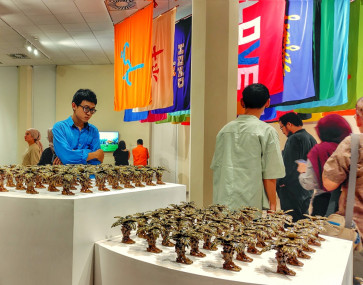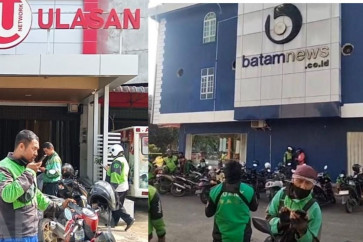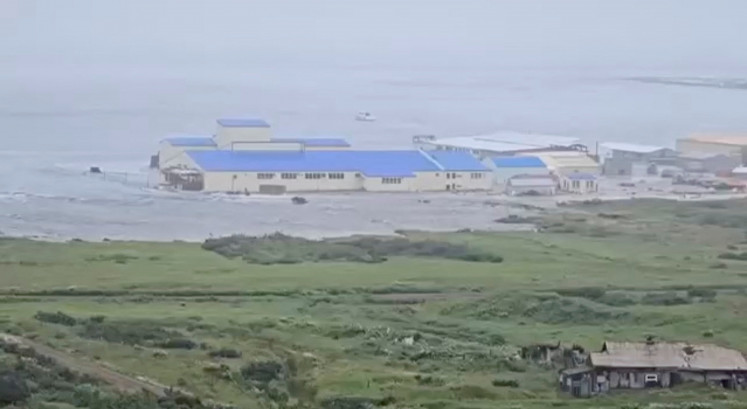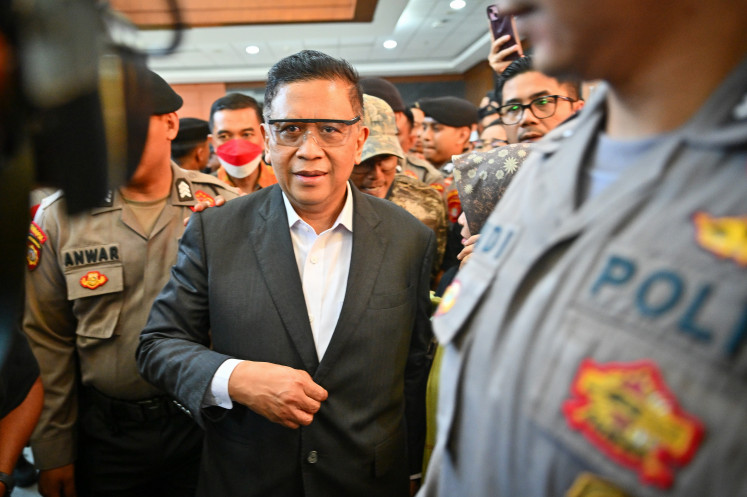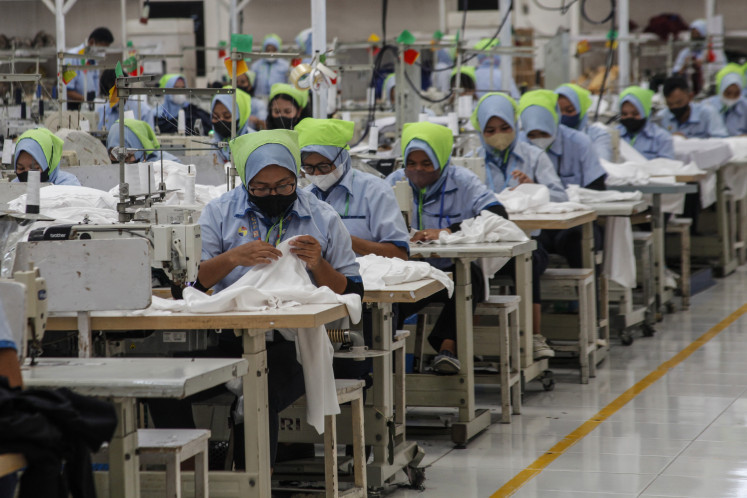Popular Reads
Top Results
Can't find what you're looking for?
View all search resultsPopular Reads
Top Results
Can't find what you're looking for?
View all search resultsUnfinished reconciliation haunts Acehnese
Renewed violence in Aceh killed at least 15 people in at least three regencies since last October, with police saying they cannot identify most of the perpetrators
Change text size
Gift Premium Articles
to Anyone
R
enewed violence in Aceh killed at least 15 people in at least three regencies since last October, with police saying they cannot identify most of the perpetrators. The following is a report by The Jakarta Post’s Nani Afrida on post-conflict reconciliation, to be followed later this week by reports on the economy and the direct local elections.
Many in Aceh have forgotten the sound of gunfire. They had enjoyed relative peace for seven years since the Free Aceh Movement (GAM) and the Indonesian government signed the historic peace deal on Aug. 15 2005, ending some 30 years of war.
But sporadic shootings since October have led police to call on the public to report or turn in any weapons in the hands of civilians by February this year. This confirmed what some suspected already — that beyond the few thousand rifles handed in to authorities, many more remain hidden, buried near homes or in private plots.
“When we heard people killed in incidents involving armed civilians, it was like our nightmares returned” said Ilyas Umar, a noodle vendor in Sigli, Pidie.
“We pray and pray that the conflict does not return, so our children can live in peace,” he added.
It may have been this wishful thinking that has led to apparent normalcy in Aceh. But in stark contrast to the carefree nights of Banda Aceh, in areas like North Aceh and Pidie, residents try to rush home before dark.
Activists and experts believe that the current tension stems from unfinished reconciliation among Acehnese, the central government, and the GAM — among many other frictions in the province.
Lecturer Teuku Kemal Fasya said that issues of “reconciliation” have been practically forgotten with all the efforts to restore as much normalcy as possible after the devastating tsunami and armed conflict.
Ideally, reconciliation should involve the painful process of truth seeking and apologies — as outlined in the Memorandum of Understanding (MoU) signed in Helsinki.
“Now, people are afraid reconciliation will hurt the peace process, so they pretend to forget it,” Kemal told The Jakarta Post recently.
Formally, reconciliation allows the traditional process of pesijeuk — the peace-making ceremony in which accused parties of numerous kinds of conflicts reveal their deeds.
“Maybe relatives would forgive the killing [of their family member], but the child [of the victim] might not accept such a lenient resolution to the crime,” a resident said, highlighting the situation facing thousands of children orphaned by the conflict.
From the time the GAM was established in 1976, until the Helsinki agreement was signed in 2005, some estimate the war claimed the lives of some 17,000 civilians.
Evidence is another problem for reconciliation — the soldiers witnessed to have killed civilians can no longer be found and places like the notorious Rumah Geudong in Pidie, where the army tortured suspected GAM affiliates, was burned to the ground.
For perpetrators affiliated with GAM, residents are fearful of raising cases of kidnapping and murder, as these former GAM figures are now in power.
Aceh Governor Irwandi Yusuf even says reconciliation is “no longer important” — as the Aceh Party, comprising many former combatants, has accepted retired military officers into their campaign teams for the upcoming local election. Many of the retired officers are Javanese, former nemesis of the Acehnese.
This example shows reconciliation has occurred “naturally”, said Irwandi, previously in charge of GAM’s intelligence unit.
However, activist Thamrin Ananda says that beyond GAM and the government, other parties of previous conflicts should be involved in reconciliation attempts. These include the grandchildren of the conflicting nobles and ulema of the 1946 Cumbok War, whose parents still endure the trauma of their elders being killed or kidnapped. To avoid trouble, many of the nobles’ descendants refrain from using honorary titles.
History reveals that Aceh has experienced 138 years of conflict and only 15 years of peace.
Dutch colonialism, starting in 1873, was followed by the Japanese invasion near the end of World War II. After the Cumbok war, Aceh rebelled against Jakarta, with the leading ulema, Daud Beureu’eh, declaring the Islamic State of Indonesia (NII). The NII surrendered with promises that sharia would be allowed in Aceh. Following the alleged coup of the Indonesian Communist Party (PKI) in 1965, Aceh was among the areas where the PKI was crushed.
The fresh conflict occurred in 1976 when the GAM declared Aceh’s independence. Jakarta responded with subsequent military operations, both overt and covert operations.
Today, seven years after the Helsinki agreement, people feel a new conflict approaching as former GAM fighters have split into two groups; those with the Aceh Party, which many former combatants previously supported, and those supporting Aceh Governor Irwandi Yusuf in his reelection bid.
Both camps are ambitious, and hope to grab power in the gubernatorial election scheduled for April 9, the fifth revised date since December. The delays were largely caused by the Aceh Party’s objections to Irwandi running as an independent candidate — a dispute finally settled by the Constitutional Court in favor of Irwandi.
“Previously we knew only one GAM group, but today we have many. This is scary,” said Ilyas Musa, a pedicab driver from Pidie.
“My family and I will support anyone as long as we can look for our daily bread,” said Ilyas.
Aulia Abdullah, a farmer from Sawang district in North Aceh Regency, also said, “Let them [GAM members] take money or power, and leave us in peace.”
Aulia said if former combatants had a better life, they would no longer be carrying rifles, and problems for civilians could be avoided.
Compared to former GAM members, he said civilians have not progressed much economically. “But that’s OK as long as there is no war anymore,” he said.
Despite former combatants’ complaints, civilians see their new cars and new houses, reportedly results of big business projects — and new wives.
Thamrin said that GAM’s internal conflict is caused by old disputes and unresolved issues.
One former GAM faction is the GAM Consultative Council, or MP GAM, led by the group’s home affairs minister, Husaini Hasan, who resides in Malaysia. A source close to the MP GAM has said the group is still seeking independence for Aceh, though their level of popular support remains unclear.
The conflict among former GAM members has largely been evident in the perceived unfairness in the distribution of compensation and jobs. It is an open secret that only a small number of former GAM members benefitted economically after the peace agreement, while the rest are without money and jobs.
Irwandi, who was Aceh’s first directly elected governor, asserted that this “small” conflict among former combatants was “temporary”.
As outlined in the MoU, the establishment of the truth and reconciliation commission should have been one way of addressing past conflicts.
However, the prospects for the establishment of such a provincial commission remain unclear after a Constitutional Court ruling in December 2006, which annulled the 2004 Law on the National Commission of Truth and Reconciliation (KKR) on technical grounds.
Sociologist Otto Syamsuddin Ishak said reconciliation attempts will forever be constrained, pending official channels for reconciliation.
He said as both GAM forces and the Indonesian Military were involved in human rights abuses, authorities “show no resolve” in finding ways to set up a reconciliation commission.
Instead of seeking the parties to blame for constraints against healing past wounds, kontraS Aceh, the provincial chapter of the independent Committee for Victims of Violence and Forced Dissappearance, has attempted to hold a number of mediations or “communal KKRs” among conflict victims.
Destika Gilang Lestari, the coordinator of kontraS Aceh, said that communal KKRs will be a channel for conflict victims to raise their cases. Thousands remain in the dark as to why their relatives are missing or were killed, or where their relatives are buried.
The communal KKR “will prepare conflict victims [for the time] when the government is ready for the formal KKR,” Gilang said. She said lasting peace for Acehnese, particularly conflict victims, was only possible through attempts to seek the truth and justice.
Meanwhile, residents continue to be wary. Ilyas Umar, a noodle seller from Kembang Tanjong village, a former GAM stronghold, was surprised upon learning the rampant circulation of firearms.
“We thought [GAM members] had decommissioned all their weapons,” he said.
But recent killings confirmed suspicions that many weapons are still in private possession — rifles bought to avenge loved ones, even if one had to sell paddy fields and livestock to buy the weapons on the black market. “I thought this peace would last forever,” said Lutfan Ali, 50, a resident from Lhokseumawe.
Highlights of Aceh, 1998-2012
1998 President Soeharto resigns. His successor, then vice president BJ Habibie, ends Aceh’s 10-year status as a Military Operation Zone launched to crush the Free Aceh Movement (GAM).
2000 The Geneva-based Henri Dunant Center for Humanitarian Dialogue (HDC) encourages direct contact between GAM and Jakarta.
May 2000 The Geneva deal for a “Humanitarian Pause” beginning June 2 marginally lowers the extent of ongoing violence.
2001 President Abdurrahman Wahid declares a “comprehensive program” for Aceh, in which only the TNI “Security Recovery Operation” is implemented.
Aug. 2001 President Megawati Soekarnoputri signs special autonomy law for Aceh.
Jan. 2002 TNI raids GAM headquarters and kills GAM commander Abdullah Syafi’ie.
May 2002 Agreement reached in Switzerland for a future “all-inclusive dialogue process” and mechanisms to establish “cessation of hostility”
Dec. 2002 HDC-brokered Cessation of Hostility agreement signed in Geneva, with the support of monitoring teams from the Philippines and Thailand.
April 2003 International monitoring missions withdrawn after militia attacks on some of them.
May 2003 Military Emergency in Aceh.
May 2004 Civil Emergency in Aceh.
Dec. 2004 Tsunami and earthquake hits Aceh, killing more than 220,000 people. Aceh eventually opens up to foreign aid workers.
Jan. 2005 Peace talks start in Helsinki.
May 2005 Civil Emergency status is lifted.
Aug. 2005 Signing of MoU between Indonesia and GAM.
Sep. 2006 Law no 11/2006 on Aceh Governance endorsed.
Dec. 2006 Aceh’s first direct gubernatorial election is won by Irwandi Yusuf-Muhammad Nazar.
July 2007 Former GAM members establish Aceh Party
April 2009 Aceh holds first local election for provincial legislative council; Aceh Party wins.
Oct. 2009 GAM patron and pro-independence leader Hasan Tiro returns to Aceh after more than 30 years living in Sweden.
June 2010 Hasan Tiro dies at 85.
Jan. 2011 Constitutional Court allows independent candidates to join gubernatorial election in Aceh despite 2006 law stating this is allowed only for Aceh’s first election.
Dec. 2011-Jan. 2012 At least six separate attacks by unidentified gunmen in North and East Aceh, Banda Aceh, Bireuen, killing seven. Exodus of migrant workers follow as victims are mostly identified as Javanese workers.
Jan. 10 House of regent candidate Misbahul Munir is shot in Keudeu Krueng Buloh Blang Ara, North Aceh.
Feb. 6 House member Irwandi Yusuf’s campaign team member Asnawi A Rahman is attacked in Peureula, East Aceh.
Feb. 7 Campaign team member of regent candidate Ridwansyah, Zulkifli bin Yahya, is tortured in Peureulak district, East Aceh.
Source: The Jakarta Post


